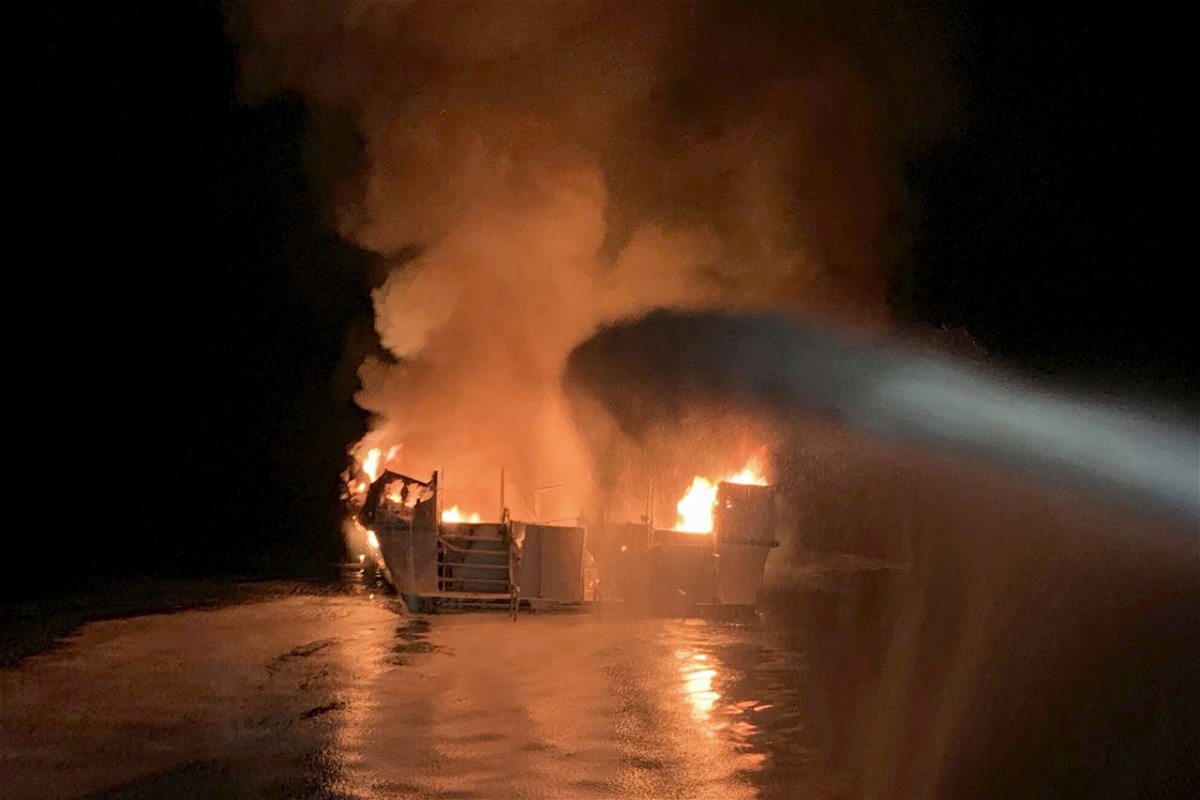Captain sentenced to 4 years for criminal negligence in fiery deaths of 34 aboard scuba boat

By STEFANIE DAZIO and AMY TAXIN, Associated Press
Edits by LILY DALLOW, News Channel 3-12
LOS ANGELES (AP) — A federal judge on Thursday sentenced a Jerry Boylan, a scuba dive boat captain, to four years in custody and three years supervised release for criminal negligence after 34 people died in a fire aboard the vessel.
"This is a statute that's rarely used, we were able to use it we were flexible, we were nimble we had this defendant convicted, and now he's going to serve four years in prison," commented Martin Estrada, U.S. Attorney for Central District of California.
The Sept. 2, 2019, blaze was the deadliest maritime disaster in recent U.S. history, and prompted changes to maritime regulations, congressional reform and several ongoing lawsuits.
Susana Solano Rosas, who lost four loved ones in the fire, said "I'm very disappointed in the sentencing of four years and three years probation for the loss of 34 lives… I've lost my belief in our justice system."
Boylan was found guilty of one count of misconduct or neglect of ship officer last year. The charge is a pre-Civil War statute colloquially known as seaman’s manslaughter. It was designed to hold steamboat captains and crew responsible for maritime disasters.
Boylan’s appeal is ongoing. He faced up to 10 years behind bars.
Kathleen McIlvain, whose son died in the fire, said "I don't know how we're going to go forward, but… We'll give it a shot for Charlie."
The defense had asked the judge to sentence Boylan to a five-year probationary sentence, with three years to be served under house arrest.
“While the loss of life here is staggering, there can be no dispute that Mr. Boylan did not intend for anyone to die," his attorneys wrote in a sentencing memo. “Indeed, Mr. Boylan lives with significant grief, remorse, and trauma as a result of the deaths of his passengers and crew.”
The Conception was anchored off Santa Cruz Island, 25 miles (40 kilometers) south of Santa Barbara, when it caught fire before dawn on the final day of a three-day excursion, sinking less than 100 feet (30 meters) from shore.
Thirty-three passengers and a crew member died, trapped in a bunkroom below deck. Among the dead were the deckhand, who had landed her dream job; an environmental scientist who conducted research in Antarctica; a globe-trotting couple; a Singaporean data scientist; and a family of three sisters, their father and his wife.
Boylan was the first to abandon ship and jump overboard. Four crew members who joined him also survived.
Thursday's sentencing was the final step in a fraught prosecution that’s lasted nearly five years and repeatedly frustrated the victims’ families.
"I don't care much about the sentence. What angers me is that Jerry Boylan's statement was not an admission of responsibility. It was that he felt sadness over the loss. Well, who doesn't? When I see a loss of life anywhere, I feel sadness over that," said James Adamic, who's sister, Diane Adamic; brother-in-law, Steven Salika; and niece Tia Salika-Adamic were killed by the fire.
"He never once said I was wrong, and that's the part that angers me tremendously. He never accepted responsibility for his role in this," said James Adamic. "He never has and I doubt he ever will."
A grand jury in 2020 initially indicted Boylan on 34 counts of seaman’s manslaughter, meaning he could have faced a total of 340 years behind bars. Boylan’s attorneys argued the deaths were the result of a single incident and not separate crimes, so prosecutors got a superseding indictment charging Boylan with only one count.
In 2022, U.S. District Judge George Wu dismissed the superseding indictment, saying it failed to specify that Boylan acted with gross negligence. Prosecutors were then forced to go before a grand jury again.
Although the exact cause of the blaze aboard the Conception remains undetermined, the prosecutors and defense sought to assign blame throughout the 10-day trial last year.
The government said Boylan failed to post the required roving night watch and never properly trained his crew in firefighting. The lack of the roving watch meant the fire was able to spread undetected across the 75-foot (23-meter) boat.
But Boylan’s attorneys sought to pin blame on Glen Fritzler, who with his wife owns Truth Aquatics Inc., which operated the Conception and two other scuba dive boats, often around the Channel Islands. They argued that Fritzler was responsible for failing to train the crew in firefighting and other safety measures, as well as creating a lax seafaring culture they called “the Fritzler way,” in which no captain who worked for him posted a roving watch.
The Fritzlers have not spoken publicly about the tragedy since an interview with a local TV station a few days after the fire. Their attorneys have never responded to requests for comment from The Associated Press.
With the conclusion of the criminal case, attention now turns to several ongoing lawsuits.
Three days after the fire, Truth Aquatics filed suit under a pre-Civil War provision of maritime law that allows it to limit its liability to the value of the remains of the boat, which was a total loss. The time-tested legal maneuver has been successfully employed by the owners of the Titanic and other vessels, and requires the Fritzlers to show they were not at fault.
That case is pending, as well as others filed by victims’ families against the Coast Guard for what they allege was lax enforcement of the roving watch requirement.

